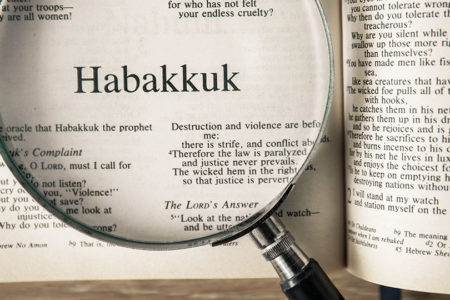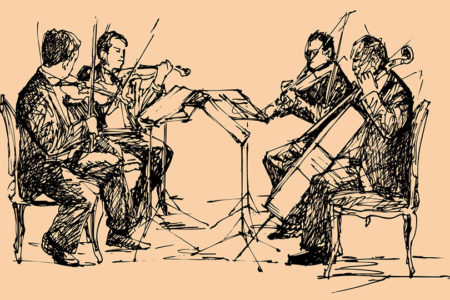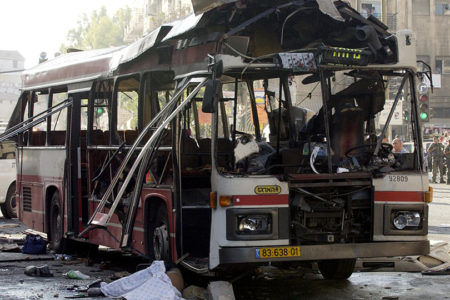Nineveh’s Destruction
Nahum 2:1-13
On March 19, 2003, a coalition of the United States and more than thirty-five countries implemented a preemptive strike against Iraq to disarm it of weapons of mass destruction. Twenty-six hundred years ago (612 B.C.) a Medo-Babylonian coalition launched a similar preemptive strike against the Assyrian capital of Nineveh (modern-day Mosul, Iraq). That coalition disarmed and demolished the boastful Assyrian nation that had slaughtered, plundered, and oppressed every country in the Middle East.
In chapter 1, Nahum announced Nineveh’s coming destruction. In chapter 2, he provided a detailed description of Assyria’s demise—and within fifty years, Nahum’s prophecy was fulfilled.
Perils of War
In a spirit of subtle sarcasm, Nahum prophesied that Assyria should ready herself for war: “He that dasheth in pieces is come up before thy face; keep the fortress, watch the way, make thy loins strong, fortify thy power mightily” (v. 1). The words He that dasheth (literally, one who scatters) in pieces refers to the huge Medo-Babylonian army under the command of Median King Cyaxares and Babylonian King Nabopolassar. The picture is of the army advancing swiftly toward Nineveh and the Ninevites scattering to seek protection from their enemy.
Nahum gave a fourfold command, calling on Nineveh to fortify itself against its attackers. First, the Ninevites were to “keep the fortress,” or set up guards to counter the invading enemy. Second, they were to “watch the way,” or set watchmen on the city walls to scan the horizon for the first sign of an invading enemy. Third, Nahum said, “make thy loins strong.” Loins speak of the seat of physical and mental strength, implying the Ninevites were to gird themselves with courage in anticipation of an attack. Fourth, he said, “fortify thy power mightily,” meaning “pull together all your strength in the face of the coming attack.” Nineveh had boasted of her impregnability; now she would have to prove it.
Before describing Nineveh’s destruction, Nahum predicted Israel’s restoration: “For the LORD hath turned away [literally, restored or brought back] the excellency [glory and honor] of Jacob, as the excellency of Israel; for the emptiers have emptied them out, and marred their vine branches” (v. 2). The “emptiers” are the Assyrians who captured the ten tribes of Israel in 722 B.C. During the conflict Assyria plundered and stripped Israel as one would strip vine branches of their fruit. Nineveh’s destruction will provide an opportunity for the glory and honor of Jacob (Southern kingdom) and Israel (Northern kingdom) to be restored.
Israel’s restoration depended on the destruction of its enemies, such as Assyria. The ultimate fulfillment of this prophecy will take place after the Great Tribulation, when the Messiah will destroy Israel’s enemies and restore the twelve tribes to the land promised the Jewish people in the Abrahamic Covenant.
The Medo-Babylonian coalition moved swiftly toward Nineveh in a rage of war. Nahum described the invasion as if he were an eyewitness:
The shield of his mighty men is made red, the valiant men are in scarlet; the chariots shall be with flaming torches in the day of his preparation, and the fir trees shall be terribly shaken. The chariots shall rage in the streets, they shall jostle one against another in the broad ways; they shall seem like torches, they shall run like lightnings (vv. 3–4).
The Medo-Babylonian army had shields of wood and wicker covered with leather or copper, and its soldiers’ clothing was scarlet. Shields, painted red to look as though they were covered with blood, along with the army’s red clothing, generated fear in the enemy.
“Chariots shall be with flaming torches” describes the sun reflecting off the steel chariots as they speed by. These probably are the chariots of the Medo-Babylonian army attacking in battle array. Not only were its chariots made of steel, so were its battle-axes, shields, armor, and the ornamentation that adorned its horses. The soldiers were known for putting scythes in the axles of their chariots, at right angles and turned downwards, to make them lethal weapons as they sped through the city in battle.1
The phrase fir trees shall be terribly shaken refers to the wooden poles, lances, and spears of cypress the Medo-Babylonian coalition brandished as its soldiers marched in battle formation—an ostentatious display of weapons to terrify the Assyrians.
Invading chariots will race toward Nineveh. Once in the city, the chariots will jostle or bump into each other on the crowded streets, looking like flashes of lightning as they race to and fro in battle.
Verse 5, “He shall recount his nobles; they shall stumble in their walk; they shall make haste to the wall, and the defense shall be prepared,” is interpreted two ways by scholars. Some teach that it refers to the Medo-Babylonian warriors who will attack Nineveh. Others say it means the king of Nineveh will rush his noble leaders to the wall in defense of the city.
Although arguments for both positions are convincing, the latter seems more probable. Nahum probably prophesied that the king of Assyria would order his commanders to assemble quickly to defend the city’s walls. But they will stumble and fall as they rush to their defensive posts.
The word defense refers to a protective covering or mantelet, prepared by either the attackers or defenders. A mantelet is a mobile screen or shield used to protect soldiers in war. The Assyrians used to put a protective barrier of interwoven branches between the towers on their city walls. Invaders likewise prepared a covering to protect their troops as they moved toward the city wall. The covering protected them from flying arrows, stones, and lighted torches.
Invaders will use the Khoser River to help destroy Nineveh: “The gates [sluices] of the rivers shall be opened, and the palace shall be dissolved” (v. 6). A 150-foot-wide moat surrounded Nineveh on three sides, with the Tigris River on the city’s west. The moat ran between two walls that protected Nineveh. In time of invasion, sluices were opened to fill the moat with water from the Khoser River, making the moat a barrier to protect the city. In the third year of the siege, heavy rains flooded the Khoser and Tigris Rivers. The invaders opened the sluices, causing floodwater from the reservoirs to break through the city walls and destroy the palace.
Plunder of Wealth
Assyria’s destruction and exile had already been decreed by God:
And it is decreed, she [some Bibles use the word Huzzab] shall be led away captive, she shall be brought up, and her maids shall lead her as with the voice of doves, beating upon their breasts (v. 7).
Although some believe Huzzab was the name of the queen or goddess of Nineveh, there is no historical proof for this interpretation. Others believe Huzzab was the symbolical name of Nineveh; but neither is there proof for this view.
The word Huzzab means “fixed, settled, determined, or decreed.” God had decreed that Nineveh be stripped of her wealth and led into exile. The pathetic scene is enhanced by the plaintive wail and mournful procession of maids (slave girls) as they lament their fate. They are victims of their master’s fate and at the mercy of ruthless soldiers. The anguish and moaning of these innocent girls as they beat their breasts in grief is said to be like the mournful sound of a dove.
In verse 8, Nineveh appears completely submerged under water as people hastily flee the city, leaving their possessions behind.
Through the prophet Nahum, the Lord called on the Medo-Babylonian coalition to gather up the spoils of war: “Take the spoil of silver, take the spoil of gold; for there is no end of the store and glory out of all the pleasant furniture” (v. 9). The spoils taken from Nineveh consisted of ill-gotten gain that Assyria had gathered from countries it had conquered. Nineveh’s wealth seemed inexhaustible. Household goods were made of gold, silver, precious stones, carved ivory, copper, and bronze.
Plight
of the Wicked
The prophet presented a picture of what Nineveh would look like after being conquered: “She is empty, and void, and waste” (v. 10). The Hebrew words empty, void, and waste express the pillaging and plundering that went on in the city. The Ninevites, in a dirge-like lament, mourn their city’s destruction. Nahum prophesied that terror would fill the once proud and fearless people of Nineveh: “The heart melteth,” or faints away like melting wax; “the knees smite together,” or shake and give way in terror; “much pain is in all loins,” or their anguish is like the pain of a mother in childbirth; “and the faces of them all gather blackness,” or take on the pale and ashen color of death as they fill with fright (v. 10).
Nahum compared Nineveh to a den of lions—an apt metaphor because Assyrian chieftain Sennacherib compared himself and the rulers of Assyria to lions. The prophet belittled this arrogant people:
Where is the dwelling of the lions, and the feeding place of the young lions, where the lion, even the old lion, walked, and the lion’s whelp, and none made them afraid? The lion did tear in pieces enough for his whelps, and strangled for his lionesses, and filled his holes with prey, and his dens with torn flesh (vv. 11–12).
The Assyrians, like lions without mercy, were rapacious, bloodthirsty predators who cruelly butchered those they conquered and proudly recorded their atrocities. As a lion fills its lair with torn flesh, so Assyria’s leaders filled Nineveh with treasures they plundered from nations they conquered. They lived in Nineveh with perfect security and never feared reprisals from those they devastated.
Assyria’s atrocities, however, will come to a screeching halt. God Himself will destroy Nineveh using the Medo-Babylonian coalition:
Behold, I am against thee, saith the LORD of hosts, and I will burn her [Nineveh’s] chariots in the smoke, and the sword shall devour thy young lions; and I will cut off thy prey from the earth, and the voice of thy messengers shall no more be heard (v. 13).
First, God will destroy the strength and mobility of the Assyrian army by burning the chariots the army relied on for swift conquest. Second, “the sword shall devour,” or slaughter, the young fighters of Nineveh. Third, God will “cut off thy prey,” that is, the wealth Assyria confiscated from the nations it conquered. Fourth, “the voice of thy messengers,” or of agents sent to collect tribute from vassal nations, will be silenced. No longer will Assyria be a threat to Israel or the surrounding nations.
God is sovereignly in control of history and will not allow wicked men and nations to go unpunished. He punished ancient Nineveh, as He said He would. And a day is coming when He will destroy all despots and Messiah will reign from Jerusalem. Then true peace, social justice, and righteousness will fill the earth.
ENDNOTE
- A. Tatford, Prophet of Assyria’s Fall (1974, reprint, Minneapolis: Klock & Klock, 1982), 36.








Dear Sir,
Thank you for an incredible synopsis. If I may ask one question, where might I find the information, “an apt metaphor because Assyrian chieftain Sennacherib compared himself and the rulers of Assyria to lions.” I just cannot seem to find this reference.
Thank you for your time.
Thank you for a most informative article. It brought alive that piece of Biblical history for me as I am reading/studying Nahum. God bless!